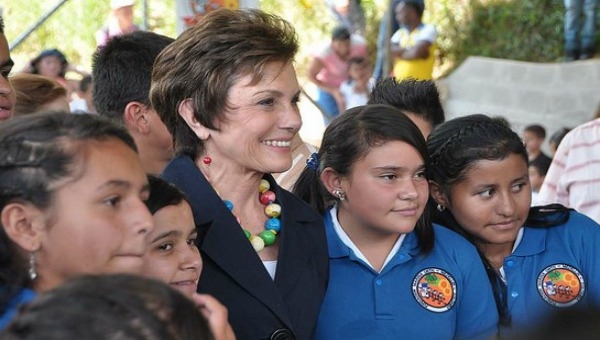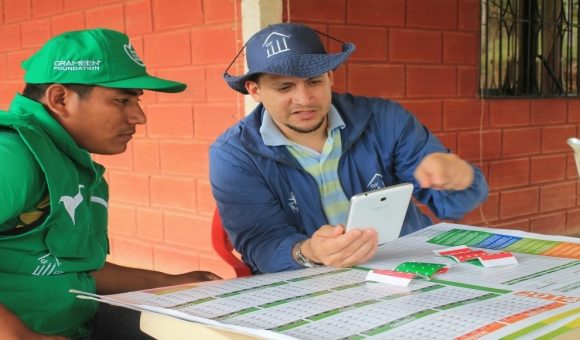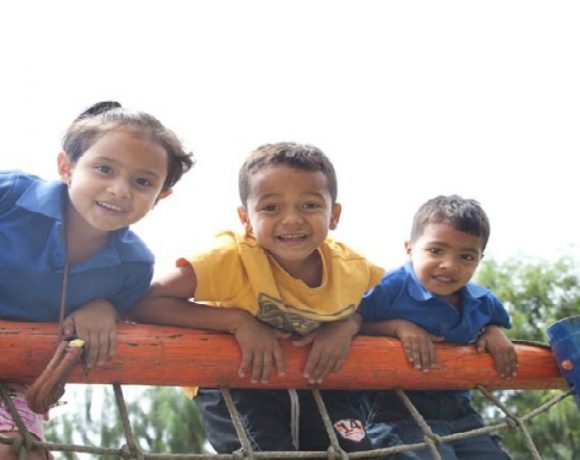Medellin’s Fundacion Marina Orth Seeks Volunteer English Teachers, Mentors, Donors

As the late North American philosopher A.B. Johnson once quipped, “mighty oaks from little acorns grow” – which aptly describes the nurturing work of Medellin-based Fundacion Marina Orth (FMO), founded in 2007 by U.S. journalist Maureen (Marina) Orth.
The ever-branching-out FMO is now seeking qualified English teachers, mentors and donors to help under-served kids in 21 Medellin and nearby public schools — as well as young adults attending several local universities — to improve their English language skills and related computer/information technology skills.
FMO also seeks “adopt-a-scholar” donors to help pay for tuition, supplies, computers, work spaces and transport for some 35 needy higher-education students — targeting grants of approximately US$2,000 to US$5,000 per-year, per-student.
“Adopt-a-scholar” donors also could band together to facilitate scholarships: four people each giving US$500 for example, according to FMO.
What’s more, in 2018, FMO also aims to launch a new teacher-training program that would start initially with 60 teachers in four-to-six schools, then eventually 1,000 local Colombian teachers in 120 local schools – all learning improved methods and employing better technologies for English teaching, for the benefit of some 30,000 local students.
According to a new FMO strategy-study supported by Bloomberg Philanthropy and Boston Consulting Group, “the new teacher training service will be free to schools, with a small proportion paid by local government,” while “FMO will rely on partnerships with foundations and corporate sponsors” to provide the bulk of funding.
While FMO isn’t yet ready to recruit volunteer teachers for that new-program launch, it is ready right now to hear from potential volunteers for its existing programs.
Volunteer contact information is available at this web site: http://www.fundaorth.org.
From Peace Corps Volunteer to Foundation Leader
Immediately upon graduating from University of California-Berkeley, Orth first planted acorns here in Medellin as a U.S. Peace Corps volunteer 1964 to 1966 — by helping to build a first-ever public school (named “Escuela Marina Orth”) in the then-isolated Aguas Frias neighborhood.
Years later, former Colombian Ambassador to the United States Luis Alberto Moreno was among the visitors at a school ceremony honoring Orth. That 2004 visit triggered a dramatic turn of events.
“The next day I was summoned into the new Secretary of Education’s office,” Orth explained. “’Marina,’ the Secretary told me, ‘these kids cannot hope to compete in the 21st century without knowing technology and English. Will you please help us make your school the first public bilingual school?’”
Spurred by the challenge, Orth immediately established a U.S.-based non-profit (Marina Orth Foundation) in 2005, and then — two years later — she established the Colombia-based non-profit Fundación Marina Orth (FMO), so that donor funds could be sent foundation-to-foundation.
“Through public-private partnerships, Intel and Chevron gave me my first donations of computers and Seagate Technology gave restored models. Later General Mills and Proctor & Gamble, HP and Coca-Cola also helped, and thanks to Motorola, my old Peace Corps site became the first WiFi village in Colombia and the first to have families on Facebook,” Orth explains.
“Today, teachers give homework assignments via email and microblog [and] Colombian entities and non-profits are my biggest donors,” with Auteco, Fraternidad Medellin and San Blas Foundation counted among the top-three-biggest local donors.
“When we didn’t have the funds to repair and maintain our computers, we taught the kids how to take them apart and put them back together from age seven, and the most proficient kids how to do the repair and maintenance themselves. Now we have a growing consultancy business to set up platforms for other schools and entities that want to learn with computers.
“We have kids learning how to program from fourth grade on. Our champion robotics club is entirely coed. We are also running a program now that Microsoft is sponsoring to train 550 young people [in 2017] who are school drop-outs and unemployed to learn computer skills they can use to go back to school or get a job.”
Meanwhile, since the Colombian government and the FARC guerilla group recently signed a peace agreement, “my foundation is in a great position to help be part of the peace process by setting up more of these training centers for former fighters — both soldiers and guerrillas,” Orth added.
“This is development, not charity,” Orth told Medellin Herald in an interview. “This is all about teaching Colombians how to compete with English language skills and technology – and two of our graduates are now English teachers themselves,” she said.
“We have an amazing, dedicated, passionate [FMO leadership] team here,” with more than a dozen working at FMO headquarters near the “Floresta” Metro station in Medellin, she added.
FMO Volunteer Requirements
In an interview at FMO headquarters here, volunteer program coordinator Susana Urrego and social-media/volunteer co-coordinator Kathleen Shriver explained to Medellin Herald what FMO is now seeking from potential volunteers.
Crucial requirements include real-world English teaching experience. Those with Test of English as a Foreign Language (TOEFL) teacher certifications would be preferable, but TOEFL certification isn’t mandatory.
FMO employs volunteer English teachers from all over the world – including those from nations where English isn’t the first (native) language. While English with a non-native-speaking accent is acceptable for FMO volunteers teaching grade-school students, a superior, native-type English pronunciation is preferred for advanced-level English teaching.
Since new volunteer teachers require about two months to learn and adapt to FMO teaching methods, FMO seeks volunteers preferably for one full year, or alternatively for at-least six months.
Besides having English proficiency and teaching experience, FMO volunteers also must have basic conversational Spanish proficiency.
While FMO’s full-fledged volunteer teachers – mainly those visiting Medellin from overseas — typically work 8-hour days/40-hour weeks, volunteer mentors or project leaders for FMO’s after-school clubs would enjoy a considerably lighter schedule, Orth told Medellin Herald.
For mentor programs, FMO would welcome teacher-volunteers with special skills in information technology (IT), software development, programming and robotics. In addition, FMO also would welcome hiring a new, dedicated volunteer for social-media work.
















